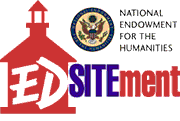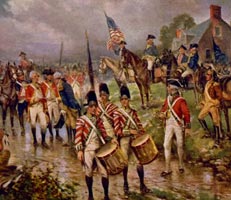|

|
What Made George Washington a Good Military Leader?
Leadership in Victory: One Last Measure of the Man
Guiding Questions:
- What qualities made George Washington an effective military leader?
- How were the responsibilities of the Commander-in-Chief affected by conditions
during the Revolutionary War?
- How did Washington's responses to these challenges demonstrate his ability
to handle a wide range of problems?
Learning Objectives
After completing this lesson, students will be able to:
- List qualities they believe made George Washington an effective military
leader.
- Discuss some difficulties Washington faced as Commander-in-Chief.
- Summarize briefly the Newburgh Conspiracy.
- Describe Washington's response to the Newburgh Conspiracy.
It was almost expected in the world of the late 18th century that the leader of
a great military victory would be amply rewarded. But Washington refused any such
reward. According to America's
First Hero on the EDSITEment resource The
American President:
The very fact that he [Washington] refused to hold on to his military
authority or to seek political or financial reward for his years of service
astonished the country. And when word of it reached King George III of England
he exclaimed, "If true, then he is the greatest man in the world."
Two incidents after the Battle of Yorktown—but before a peace treaty was
signed officially declaring an end to hostilities—tested Washington's resolve
to refuse power in exchange for his military leadership. Keep in mind that, at
this point, the army had not disbanded and had not been paid as promised. This
combination of inactivity and injustice can easily breed dissatisfaction.
The Nicola Letter and Washington's Response
The first test of Washington's resolve came in a letter (and a series of observations
appended to the letter) from one of his officers, Lewis Nicola, dated May 22,
1782. (NOTE: The letter is available in the George
Washington Papers collection on the EDSITEment-reviewed website American
Memory, but unfortunately has not been transcribed. Interested students might
want to try to do some transcribing, but this would be an extension, not part
of this lesson. Click here for the Beginning
of Nicola's Letter.)
Nicola began his observations by briefly noting "the injuries the troops
have received" in financial matters—that is, the soldiers had not been
paid what they were owed. (If desired, see the Beginning
of Nicola's Observations.) He concluded by saying "this war must have shown
to all, but especially to military men in particular, the weakness of republicks."
In other words—in the most extreme interpretation of Nicola's remarks,
and apparently the meaning Washington derived—the country would be better
off with Washington as king. (If desired, see the End
of Nicola's Observations.)
Share with the class the audio background information on Lewis Nicola's letter,
Larry
Arn on Lewis Nicola's Letter to Washington and Washington's Response, on
the PBS website Liberty!
The American Revolution, a link from American
Memory.
Read with students Washington's Letter
to Lewis Nicola, also available on Liberty!
The American Revolution. What was Washington's response to Nicola's suggestion?
Did he leave any room for a reconsideration of Nicola's suggestion? Did he show
sympathy for the plight of the soldiers? Where in the letter, if at all, did
Washington speak with respect? Disrespect? How would the students describe the
overall tone of Washington's response? If the students were assigned to plan
a dramatic reading of the speech by the best actor in the class, what recommendations
would they make for the reading of any particular portion of the text?
If desired, listen to the reading of the speech by Charlton Heston. How does
Heston's reading compare to the plan the students made?
The Newburgh Conspiracy
In March of 1783, an anonymous petition—sometimes attributed to Major John
Armstrong—appeared as part of what has become known as the Newburgh Conspiracy
(also called the Newburgh Mutiny). The author referred to the valid complaints
of the soldiers, who had not been paid even after they had written to Congress
about their grievances.
Washington had recognized the problem long before, and had, in fact, written
to Armstrong in January of 1783:
The Army, as usual, are without Pay; and a great part of the Soldiery
without Shirts; and tho' the patience of them is equally thread bear [sic], the States
seem perfectly indifferent to their cries.
—From George
Washington to John Armstrong, January 10, 1783 on the EDSITEment resource
American Memory
The anonymous petition's most crucial passage contained a not-so-veiled threat
that the army could bypass the normal civil authority and request that Washington
lead what would be tantamount to a military dictatorship. The author told the
soldiers they did not need to feel powerless despite the failure of Congress to
act on their grievances:
…in any political event, the army has its alternative. If peace, that
nothing shall separate you from your arms but death; if war, that courting the
auspices [help], and inviting the directions of your illustrious leader, you
will retire to some unsettled country, smile in your turn, and "mock when their
fear cometh on."
—From The
Newburgh Address on Archiving Early
America, a link from the EDSITEment-reviewed website Internet
Public Library
In other words, if peace came, soldiers could keep their weapons ("nothing shall
separate you from your arms but death") and use force to defy civil authority
to get what they wanted. (Remember that Washington himself had expended a great
deal of energy during the war trying to get the civil authorities to keep their
commitments to the military, such as fulfilling quotas for men. As Commander-in-Chief,
he had been a victim of the conflict between these two powers, yet came down squarely
for civilian control.) If war were to continue, the army could leave the country undefended
("retire to some unsettled country"). In that case, the army would invite its
"illustrious leader" to command it. When Congress—inevitably, the conspirators
assumed—eventually begged the army to return, the army would have great power
and, should he choose to participate when invited, Washington would have absolute
command of that power.
If desired, share additional information about the Newburgh Conspiracy from
the class text or from a source such as the essay about Washington's Life
Before the Presidency on the EDSITEment resource The
American President.
The Gilder
Lehman Document Collection: George Washington, Revolutionary War Years,
part of the PBS website Liberty!
The American Revolution, a link from the EDSITEment resource American Memory,
offers a brief audio explanation of the Newburgh Conspiracy. If desired, listen
to the audio explanation with the class. Read the text of Washington's Speech
to Officers at Newburgh with the class, or if you want your students to
interact with the text, place students in small groups and assign specific paragraphs
to each from the nine in the speech. Each group should prepare an oral interpretive
reading of its paragraph(s) by one or more members of the group. In preparing
the reading, students should consider:
- How was Washington's criticism of the petition reflected in the tone and
content of the speech?
- How was Washington's relationship to the officers reflected in his content
and tone? Can you tell how the officers felt about Washington?
- In what ways did Washington show respect to the service of the officers
and validate their concerns?
- In what ways did Washington shrewdly manipulate the situation?
- Do you think Washington planned ahead the dramatic gesture with his glasses?
- What leadership qualities did Washington display in his handling of the
Newburgh Conspiracy?
Assessment
Discuss how his handling of the Nicola letter and the Newburgh Conspiracy reflected
the character and leadership qualities of George Washington.
Selected EDSITEment Websites
Standards Alignment
View your state’s standards
|





